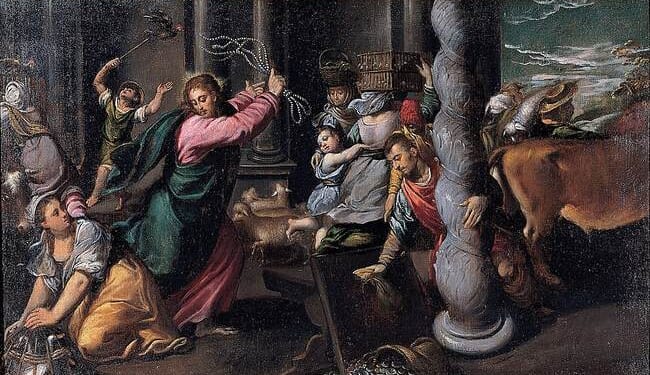
This morning’s Gospel reading is John 2:13–22:
Since the Passover of the Jews was near, Jesus went up to Jerusalem. He found in the temple area those who sold oxen, sheep, and doves, as well as the money-changers seated there. He made a whip out of cords and drove them all out of the temple area, with the sheep and oxen, and spilled the coins of the money-changers and overturned their tables, and to those who sold doves he said, “Take these out of here, and stop making my Father’s house a marketplace.” His disciples recalled the words of Scripture, Zeal for your house will consume me.
At this the Jews answered and said to him, “What sign can you show us for doing this?” Jesus answered and said to them, “Destroy this temple and in three days I will raise it up.” The Jews said, “This temple has been under construction for forty-six years, and you will raise it up in three days?” But he was speaking about the temple of his Body. Therefore, when he was raised from the dead, his disciples remembered that he had said this, and they came to believe the Scripture and the word Jesus had spoken.
Who truly builds in Creation? To whom goes the glory? And what is the nature of that creation?
These questions have plagued mankind since the beginning of time. They have particularly plagued Christianity, from its earliest days. The fallen world in which we live can make the idea that it came from the Lord as a good rather than an evil almost impossible to believe, and in fact heresies arose almost immediately to argue against that belief. The most prominent among those were (and still are) Gnosticism and Docetism, related but separate heresies regarding both the nature of Christ and Creation itself.
The appeal of Gnosticism (which has many, many variants) is that it relies on secret knowledge, in which the physical creation around us hides and deceives us because of its evil nature. The only good part of God’s creation is the purely spiritual realm. Docetism follows from that; it argues that Jesus never had corporeal form at all, before or after the Resurrection, and therefore had no connection to the evil physical creation.
These systems reject the idea of a beneficent Creator who allowed His children to take their inheritance and rule it. It also rejects any straightforward literal, theological, or historical reading of the scriptures. Since those directly contradict the underlying assumption of these heresies, both Gnosticism and Docetism posit a secret knowledge that bypasses the Gospels, the epistles, and the Septuagint-based Old Testament to argue that only secret knowledge can unlock salvation.
The Apostle John knew of these arising heresies early enough in Christianity to warn the Church about the “many false prophets” already plaguing it. In this warning, John explicitly refers to Christ having come in the flesh, or in other words, as part of the material world of Creation birthed through Him (1 John 4:1-3, emphasis mine):
Dear friends, do not believe every spirit, but test the spirits to see whether they are from God, because many false prophets have gone out into the world. This is how you can recognize the Spirit of God: Every spirit that acknowledges that Jesus Christ has come in the flesh is from God, but every spirit that does not acknowledge Jesus is not from God. This is the spirit of the antichrist, which you have heard is coming and even now is already in the world.
All of the apostles testified to this. Paul alludes to it in our second reading today from the first letter to the Corinthians, when he preaches that each of us is a temple of God, the master builder:
You are God’s building. According to the grace of God given to me, like a wise master builder I laid a foundation, and another is building upon it. But each one must be careful how he builds upon it, for no one can lay a foundation other than the one that is there, namely, Jesus Christ.
Do you not know that you are the temple of God, and that the Spirit of God dwells in you? If anyone destroys God’s temple, God will destroy that person; for the temple of God, which you are, is holy.
Why did John have to explicitly preach that Christ came in the flesh? The concept was horrifying to the Israelites at the time, as they saw the world entirely as God’s creation but degraded by sin. The idea that the Divine would assume flesh to reach out for salvation was a condescension on a scale too enormous to be imagined, especially to suffer the indignation of crucifixion. It was easier to believe that Jesus had only a spiritual nature and had appeared only as a ghost, and therefore not part of a material world that was entirely unworthy and must be rejected or destroyed.
This brings us to our Gospel reading today. Jesus sees the corruption of the temple, itself a corrupt version of the first temple. The second temple was built by Herod as a monument more to himself than the Lord, a way to keep power as a Roman puppet during the occupation. The trade at the temple for sacrifices had become an end in itself rather than an honest way to support the process of atonement for sins.
Did Jesus destroy the temple due to the sin taking place within it? No; he drove out the wicked people who sinned within it, and warned about the judgment to come if people did not heed His warning. Jesus even specifically calls the temple “My Father’s house,” even with the corruption in its origin and the corruption taking place within it.
Why? Because, while much of what we do with God’s Creation is sinful and corrupt, the Lord never intended it for evil. He created the world for our happiness, where the spiritual and material could live in harmony with the Divine under His kingship. We rejected that kingship and seized His creation, just as the younger prodigal son did in the parable, but it does not change the nature of the Father or His kingdom and creation.
When we build in this world, then, we build with goodness at our hands. What we do with that goodness will be the basis for our judgment in the end. Jesus did not pull down the temple due to wickedness, but only punished the wicked. The temple may have been built by a wicked man for corrupt purposes, but it still belonged to the Father — just as all things in Creation ultimately do.
Jesus does not come to us in spirit alone. He comes to us in the flesh to sanctify the flesh and the material world, as part of the Father’s gift to us. We are not called to Heaven in spirit alone, but in the flesh as well. The City of God that awaits us is prepared for both our material and spiritual natures, washed clean in the physical and divine nature of Christ.
There is no “secret knowledge” of salvation. Christ did not come to us in the flesh and sacrifice Himself on a cross, return from the dead, and send the Holy Spirit to us to keep secrets. Christ founded the Church to proclaim salvation and to “make disciples of all nations” to spread the Good News. The fallen world creates obstacles to salvation, but that is not the fault of the world or its Master Builder. Its fallen nature results from our own sinful appetites and selfishness, the latter of which is a key feature of Gnosticism — the hoarding of supposed goods for the benefit of few rather than the salvation of many.
Proclaim the Good News, and lay the proper foundation in this world for the salvation of our brothers and sisters.
Previous reflections on these readings:
The front page image is “Driving of the Merchants From the Temple” by Scarsellino, c.1580-5. On display at the Capitoline Museums in Rome. Via Wikimedia Commons.
“Sunday Reflection” is a regular feature that looks at the specific readings used in today’s Mass in Catholic parishes around the world. The reflection represents only my own point of view, intended to help prepare myself for the Lord’s day and perhaps spark a meaningful discussion. Previous Sunday Reflections from the main page can be found here.
Join Hot Air VIP, VIP Gold, or VIP Platinum, and use promo code POTUS47 to get 74% off your membership!










